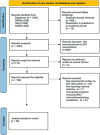Do expressive writing interventions have positive effects on Koreans?: a meta-analysis
- PMID: 38076691
- PMCID: PMC10702225
- DOI: 10.3389/fpsyt.2023.1204053
Do expressive writing interventions have positive effects on Koreans?: a meta-analysis
Abstract
Introduction: Expressive Writing (EW) is an intervention that focuses on individuals' writing down their thoughts and feelings about trauma or stressful events. Meta-analyses on EW studies have confirmed that EW has a positive effect. However, the heterogeneity of studies is high, so many studies have investigated boundary conditions and moderators. One of these moderators is the cultural difference in emotional suppression. Since EW focuses on the expression of suppressed thoughts and emotions, its effect might be slightly different for people in Asian cultures who show a high tendency to suppress their emotions. This study attempted to confirm the effect size of the EW interventions in Korea and examine whether these studies have different effect size from those based on Western cultures.
Method: A total of 29 studies published in Korea until 2021 were analyzed. The effect size was calculated using the "dmetar," "meta," and "metafor" packages of the statistical program R 4.0.4.
Results: The results were as follows. First, the effect size of EW intervention was 0.16, and we found that studies in the Korean context showed no significant difference from studies based on western meta-analysis. Second, the moderating variables that influenced the EW intervention were the writing type, the number of sessions, the time per session, and the measurement time.
Discussion: The results of this study suggest that EW interventions benefit Koreans. And it is at least harmless and has a positive effect considering the efficiency and conciseness of interventions. Furthermore, the finding shows that EW interventions can be helpful even in the general population without apparent psychological problems. By considering moderators, we could structure more effective form of EW interventions for Koreans.
Keywords: effect size; emotional exposure; expressive writing; meta-analysis; self-disclosure; writing therapy.
Copyright © 2023 Lee, Kim and Lim.
Conflict of interest statement
The authors declare that the research was conducted in the absence of any commercial or financial relationships that could be construed as a potential conflict of interest.
Figures
References
-
- Pennebaker JW. Theories, therapies, and taxpayers: on the complexities of the expressive writing paradigm. Clin Psychol Sci Pract. (2004) 11:138–142. 10.1093/clipsy.bph063 - DOI
Publication types
LinkOut - more resources
Full Text Sources





